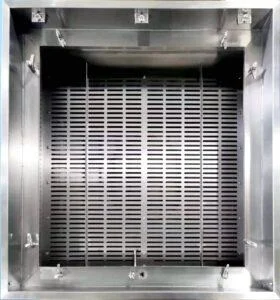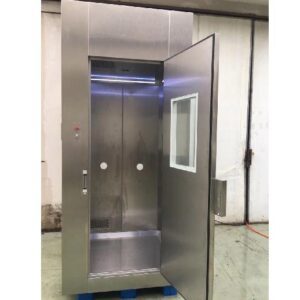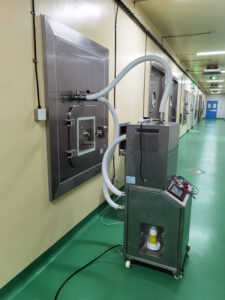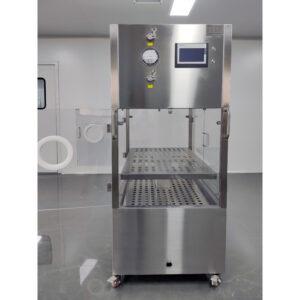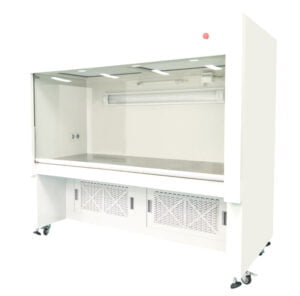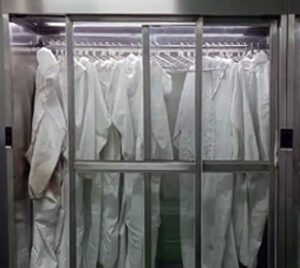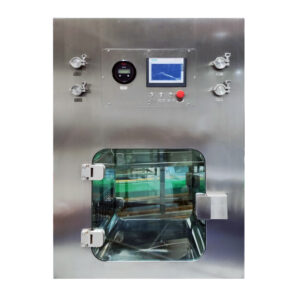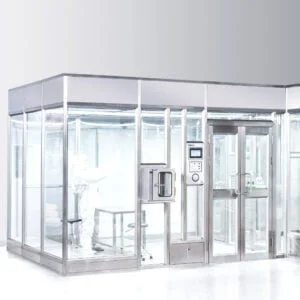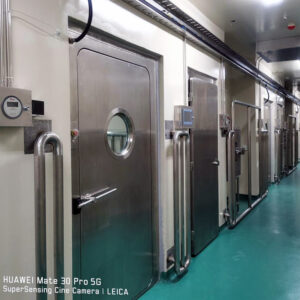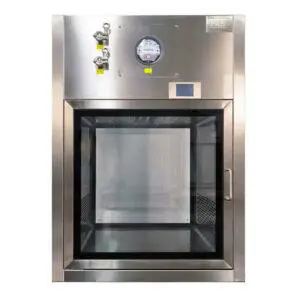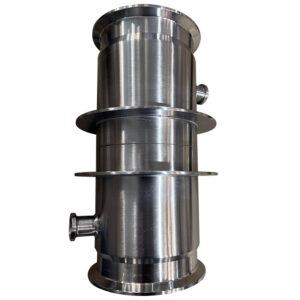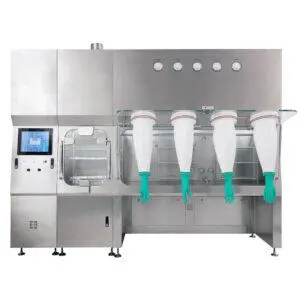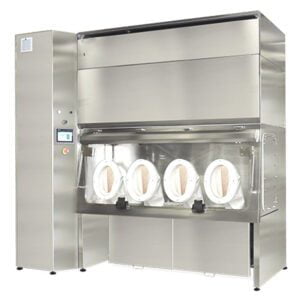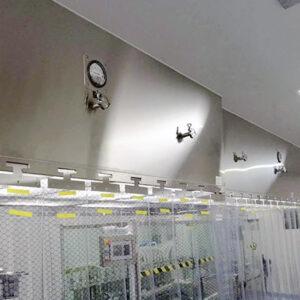Chemical resistant materials are essential for constructing durable and safe shower rooms, especially in environments where exposure to harsh chemicals is a concern. As an expert in the field, I've seen firsthand how the right materials can make a significant difference in the longevity and performance of shower facilities. The importance of selecting appropriate chemical resistant materials for showers cannot be overstated, particularly in industrial, laboratory, or healthcare settings where chemical exposure is a daily reality.
In this comprehensive guide, we'll explore the world of chemical resistant materials for shower room construction. We'll delve into the various options available, their properties, and how they contribute to creating a safe and long-lasting shower environment. From specialized coatings to innovative building materials, we'll cover everything you need to know to make informed decisions about your shower room construction project.
As we begin our journey through the realm of chemical resistant shower materials, it's crucial to understand that not all materials are created equal. Some excel in resisting specific types of chemicals, while others offer broader protection. We'll examine the pros and cons of different materials, their application methods, and how they stand up to the rigors of daily use in chemically challenging environments.
Chemical resistant materials for showers are not just a luxury; they are a necessity in many industrial and scientific settings. These materials provide a crucial barrier against corrosive substances, ensuring the safety of users and the longevity of the shower facility.
What are the most effective chemical resistant materials for shower construction?
When it comes to constructing showers that can withstand chemical exposure, several materials stand out for their exceptional resistance properties. These materials are designed to maintain their integrity even when subjected to harsh chemicals, making them ideal for use in industrial, laboratory, or healthcare settings.
One of the most popular choices for chemical resistant shower construction is epoxy-based materials. These synthetic resins offer excellent resistance to a wide range of chemicals, including acids, alkalis, and solvents. Epoxy coatings and flooring systems provide a seamless, non-porous surface that prevents chemical penetration and makes cleaning and maintenance much easier.
Another highly effective option is polyurethane-based materials. These versatile compounds offer superior chemical resistance and can be formulated to provide additional properties such as UV stability and flexibility. Polyurethane coatings and linings are often used in shower areas that require both chemical resistance and impact resistance.
According to industry experts, epoxy and polyurethane-based materials can provide up to 99% protection against common industrial chemicals when properly applied and maintained in shower environments.
| Material | Chemical Resistance | Durability | Ease of Maintenance |
|---|---|---|---|
| Epoxy | Excellent | High | Very Easy |
| Polyurethane | Excellent | Very High | Easy |
| PVC | Good | Medium | Moderate |
| Stainless Steel | Very Good | High | Easy |
How do chemical resistant coatings enhance shower room durability?
Chemical resistant coatings play a crucial role in enhancing the durability of shower rooms exposed to harsh chemicals. These specialized coatings act as a protective barrier, shielding the underlying substrate from chemical attack and preventing degradation over time.
One of the primary benefits of chemical resistant coatings is their ability to create a seamless, impermeable surface. This eliminates weak points and joints where chemicals could potentially penetrate and cause damage. The YOUTH line of chemical resistant coatings, for instance, offers exceptional protection against a wide range of corrosive substances.
In addition to their protective properties, these coatings often provide additional benefits such as improved slip resistance, easier cleaning, and enhanced aesthetic appeal. Many chemical resistant coatings can be customized in terms of color and finish, allowing for both functional and visually appealing shower room designs.
Studies have shown that properly applied chemical resistant coatings can extend the lifespan of shower room surfaces by up to 300% compared to uncoated surfaces in chemically harsh environments.
| Coating Type | Chemical Resistance | Slip Resistance | Lifespan (Years) |
|---|---|---|---|
| Epoxy | High | Good | 10-15 |
| Polyurea | Very High | Excellent | 15-20 |
| Polyaspartic | High | Very Good | 12-18 |
| Urethane | High | Good | 8-12 |
What are the key considerations when selecting chemical resistant flooring for showers?
Selecting the right chemical resistant flooring for showers requires careful consideration of several factors. The choice of flooring can significantly impact the safety, durability, and functionality of the shower room, especially in environments where chemical exposure is a concern.
First and foremost, it's essential to assess the types of chemicals that the flooring will be exposed to regularly. Different flooring materials have varying levels of resistance to specific chemicals, so understanding the chemical environment is crucial. For example, some epoxy flooring systems excel at resisting acids but may be less effective against certain solvents.
Another critical factor is the level of slip resistance required. Chemical resistant flooring should not only withstand chemical exposure but also provide a safe, non-slip surface when wet. Many chemical resistant flooring options, such as those offered in the Chemical resistant materials for showers product line, incorporate textured surfaces or anti-slip additives to enhance safety.
Industry standards recommend that chemical resistant flooring for showers should have a minimum slip resistance rating of R11 on the DIN 51130 scale to ensure adequate safety in wet and potentially contaminated conditions.
| Flooring Material | Chemical Resistance | Slip Resistance | Cost ($/sq ft) |
|---|---|---|---|
| Epoxy Resin | Excellent | Very Good | $3-$12 |
| Polyurethane Cement | Very Good | Excellent | $6-$15 |
| Vinyl | Good | Good | $2-$8 |
| Rubber | Fair | Excellent | $3-$8 |
How do chemical resistant wall panels contribute to shower room safety?
Chemical resistant wall panels are an integral component of safe and durable shower room construction, particularly in environments where chemical exposure is a concern. These specialized panels are designed to withstand continuous contact with a wide range of chemicals without degrading or compromising their structural integrity.
One of the primary advantages of chemical resistant wall panels is their ability to create a seamless, impermeable surface. This eliminates joints and seams that could potentially harbor bacteria or allow chemical penetration. The smooth, non-porous surface of these panels also makes cleaning and decontamination procedures much more efficient and effective.
Many chemical resistant wall panels are also designed with impact resistance in mind. This dual functionality ensures that the shower room remains protected not only from chemical exposure but also from physical damage that could compromise its chemical resistance properties.
Research indicates that chemical resistant wall panels can reduce the risk of chemical-related incidents in shower rooms by up to 85% compared to traditional tiled surfaces, making them a crucial safety feature in industrial and laboratory settings.
| Wall Panel Material | Chemical Resistance | Impact Resistance | Installation Complexity |
|---|---|---|---|
| FRP (Fiberglass Reinforced Plastic) | High | Good | Moderate |
| PVC | Good | Fair | Easy |
| HDPE | Excellent | Excellent | Moderate |
| Stainless Steel | Very Good | Excellent | Complex |
What role do sealants and grouts play in chemical resistant shower construction?
Sealants and grouts play a crucial but often overlooked role in the construction of chemical resistant showers. These materials are essential for filling gaps, joints, and seams between tiles, panels, or other shower components, ensuring a watertight and chemically resistant barrier throughout the entire shower structure.
When it comes to chemical resistant shower construction, not just any sealant or grout will do. Specialized formulations are required to withstand constant exposure to water, cleaning agents, and potentially harsh chemicals. Epoxy-based grouts and sealants are particularly popular in this context due to their excellent chemical resistance and durability.
It's important to note that the effectiveness of sealants and grouts in a chemical resistant shower depends not only on the material itself but also on proper application. Even the most chemically resistant sealant can fail if not applied correctly, leading to potential weak points in the shower's chemical barrier.
Studies have shown that using chemical resistant sealants and grouts can increase the overall chemical resistance of a shower room by up to 40%, highlighting their importance in creating a comprehensive chemical barrier.
| Sealant/Grout Type | Chemical Resistance | Flexibility | Setting Time (Hours) |
|---|---|---|---|
| Epoxy | Excellent | Low | 24-48 |
| Urethane | Very Good | High | 24-72 |
| Silicone | Good | Very High | 24 |
| Cement-based | Fair | Low | 24-48 |
How do chemical resistant drains contribute to shower room functionality?
Chemical resistant drains are a critical component in the design and functionality of shower rooms exposed to harsh chemicals. These specialized drainage systems are engineered to withstand continuous exposure to corrosive substances while maintaining their structural integrity and performance.
One of the key features of chemical resistant drains is their material composition. Many are constructed from high-grade stainless steel or advanced polymers that offer superior resistance to a wide range of chemicals. This ensures that the drainage system remains functional even in the most challenging chemical environments.
Beyond their chemical resistance properties, these drains often incorporate design features that enhance their functionality in shower room settings. For example, many chemical resistant drains feature smooth, crevice-free surfaces that prevent chemical buildup and make cleaning easier. Some models also include removable strainers or catch basins that allow for easy maintenance and prevent large debris from entering the drainage system.
Industry data suggests that implementing chemical resistant drains can reduce maintenance costs related to drainage system failures by up to 70% in shower rooms regularly exposed to harsh chemicals.
| Drain Material | Chemical Resistance | Load Capacity | Price Range ($) |
|---|---|---|---|
| 316 Stainless Steel | Excellent | High | 200-500 |
| HDPE | Very Good | Medium | 100-300 |
| PVC | Good | Low | 50-150 |
| Cast Iron (Coated) | Very Good | Very High | 300-700 |
What are the best practices for maintaining chemical resistant shower rooms?
Maintaining chemical resistant shower rooms is crucial for ensuring their longevity, functionality, and safety. Proper maintenance not only preserves the chemical resistant properties of the materials but also helps prevent potential hazards and extends the overall lifespan of the shower facility.
One of the most important aspects of maintenance is regular cleaning and inspection. Chemical resistant surfaces should be cleaned with appropriate, non-abrasive cleaners that won't compromise their protective properties. It's also essential to inspect all surfaces, including walls, floors, and drains, for any signs of wear, damage, or chemical attack.
Another key practice is prompt repair of any damaged areas. Even small cracks or chips in chemical resistant surfaces can lead to more significant problems if left unaddressed. It's crucial to use compatible repair materials that match the chemical resistance of the original surface to maintain the integrity of the protective barrier.
Implementing a rigorous maintenance schedule for chemical resistant shower rooms can increase their operational lifespan by up to 50% and reduce the risk of chemical-related incidents by as much as 75%.
| Maintenance Task | Frequency | Importance | Time Required (Hours) |
|---|---|---|---|
| Routine Cleaning | Daily | High | 0.5-1 |
| Deep Cleaning | Weekly | Very High | 2-4 |
| Inspection | Monthly | Critical | 1-2 |
| Resealing | Annually | High | 4-8 |
In conclusion, the use of chemical resistant materials in shower room construction is paramount for ensuring safety, durability, and functionality in environments where exposure to harsh chemicals is a concern. From specialized coatings and flooring systems to chemical resistant wall panels, drains, and sealants, each component plays a vital role in creating a comprehensive chemical barrier.
The selection of appropriate materials requires careful consideration of factors such as the types of chemicals present, frequency of exposure, and required level of resistance. It's also crucial to remember that even the most advanced chemical resistant materials require proper installation and regular maintenance to perform effectively.
By implementing best practices in material selection, installation, and maintenance, it's possible to create shower rooms that not only withstand chemical exposure but also provide a safe and reliable environment for users. As technology continues to advance, we can expect even more innovative solutions in the field of chemical resistant materials for shower room construction, further enhancing safety and performance in these critical facilities.
External Resources
- The Decofloor – This resource describes the Decofloor Seamless Shower System, a chemical-resistant, slip-resistant coating made from a solvent-free polyurethane system that is VOC compliant and uses renewable raw materials.
- Build with Rise – This guide covers various types of waterproofing membranes for showers, including sheet membranes, liquid membranes, and foam wallboards, highlighting their installation and benefits.
- My Chemical-Free House – This article provides a comprehensive guide to non-toxic and chemical-resistant materials for bathrooms, including recommendations for tiles, shower walls, and waterproofing systems.
- Schluter – This resource details Schluter's KERDI and KERDI-DS waterproofing membranes and accessories, which are designed to protect shower walls and other tiled areas from moisture.
- The Spruce – This guide provides a detailed step-by-step process for waterproofing a shower, including the use of liquid membranes and other chemical-resistant materials.
- Hunker – This article lists and describes the best materials for creating a waterproof shower, including cementitious boards, Kerdi boards, and liquid waterproofing membranes.
Related Contents:
- Emergency Chemical Shower Rooms: Quick Response Guide
- Stainless Steel Chemical Shower Rooms: Durability Guide
- Enclosed Chemical Shower Rooms: Privacy and Safety
- Chemical Shower Room Lighting: Safety and Visibility
- ADA Compliant Chemical Shower Rooms: Accessibility Guide
- PPE for Chemical Shower Rooms: Essential Gear Guide
- Laboratory Chemical Shower Rooms: Essential Features
- Outdoor Chemical Shower Rooms: Weather-Resistant Options
- Top 5 Portable Chemical Shower Rooms for Labs


